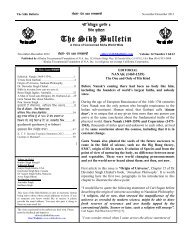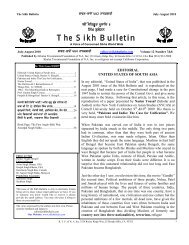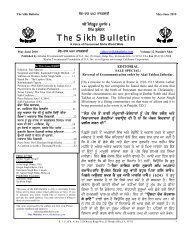Selected Editorials - The Sikh Bulletin
Selected Editorials - The Sikh Bulletin
Selected Editorials - The Sikh Bulletin
You also want an ePaper? Increase the reach of your titles
YUMPU automatically turns print PDFs into web optimized ePapers that Google loves.
3. Substituting words ‘Akal Purakh’ for ‘Bhagauti’ in the <strong>Sikh</strong> Ardaas.<br />
4. Birth of <strong>The</strong> <strong>Sikh</strong> <strong>Bulletin</strong> as an instrument of reform in <strong>Sikh</strong>i.<br />
5. Initiation of practice of annual conferences.<br />
Next person who came into my <strong>Sikh</strong>i Reformation life has very kindly agreed to assume the major<br />
responsibility for the publication of <strong>The</strong> <strong>Sikh</strong> <strong>Bulletin</strong> in its new vision, as Editor-In-Chief, to carry the<br />
message of Guru Nanak to the non-<strong>Sikh</strong>s and to those <strong>Sikh</strong>s who choose to listen to unadulterated version<br />
of Gurbani, unencumbered by rituals and miracles being practiced in all of our Gurdwaras, including<br />
Darbar Sahib. He is S. Gurpal Singh Khaira.<br />
Gurpal Singh Khaira left India at a very young age and was educated in England and Canada. After a very<br />
successful career at upper management level in the Canadian Government and private sector which took<br />
him all over the world, he retired to<br />
Sacramento area to be closer to his Doctor Sons and grandchildren. He is a Punjabi language poet and<br />
fiction writer and loves <strong>Sikh</strong> classical kirtan music. He had been very active most of his life organizing<br />
<strong>Sikh</strong> conferences to teach and propagate Guru Nanak's mission as enshrined in Shri Guru Granth Sahib<br />
Ji. He had been frequent speaker at <strong>Sikh</strong> forums and his articles have been published in <strong>Sikh</strong> Review,<br />
<strong>Sikh</strong> <strong>Bulletin</strong>, and other local publication.<br />
He started visiting us in Roseville around the year 2000 when he moved to this area from Southern<br />
California. This was the time when we had decided to call our reform movement ‘Singh Sabha<br />
International’.<br />
I address him as Singh Sahib because he really foots the bill; he considers me as his older brother. But<br />
more appropriately he would be my brother-in-law because he is married to a Shergill from my ancestral<br />
village in District Jalandhar that my great-grandmother and her family left for Bikaner state nine decades<br />
ago, my great-grandfather having passed away at a rather young age. Or it could be a relationship one<br />
generation up or down. It is not unusual among large families that have stayed in the same place over a<br />
long period of time to have age differences that create unusual relationships.<br />
<strong>The</strong> only time I went to my family’s ancestral village was when my father took me there when I was six<br />
years old. I remember three things from that visit:<br />
1. Mela at Kultham with all its fun events.<br />
2. Train with just as many passengers riding on the roof as inside and a whole lot hanging from the<br />
doors.<br />
3. And in the house of my father’s second cousin kids twice my age looking at me and giggling<br />
while addressing me as their granduncle.<br />
Being a student of History, Geography and Indo-European language I cannot help but wonder where my<br />
family’s roots lie in the distant past. North Indians belong to a group called Caucasians because they<br />
supposedly migrated east and west from the region of Caucasus Mountains. <strong>The</strong> two syllables of my first<br />
name ‘Har’ and ‘Dev’ have clearly Indian connotation because in Hinduism they both refer to ‘God’. <strong>The</strong><br />
two syllables of my last name ‘Sher’ and ‘Gill’, however, are clearly of Persian origin, meaning ‘Lion’<br />
(Shir) and ‘soil’ in Persian. A northern province of Iran that slopes down from the mountains to the shores<br />
of the Caspian Sea is called ‘Gilan’ and its inhabitants are called ‘Gils’. Surname Gill or versions of it are<br />
widespread. Pakistan has Gilani surnames, Pakistan and India have Gills and Shergills, British Isles have<br />
Gills, McGills, Cowgills and Scargills.<br />
Sorry I got carried away; you cannot be immersed in Gurbani and not think everybody is your cousin.<br />
80
















